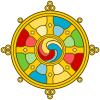
Back Tsongkhapa Afrikaans جي تسونغكهابا Arabic جى تسونغكهابا ARZ Дже Цонкапа Bulgarian ত্সোং-খা-পা-ব্লো-ব্জাং-গ্রাগ্স-পা Bengali/Bangla རྗེ་ཙོང་ཁ་པ་བློ་བཟང་གྲགས་པ་ Tibetan Богдо Зонхобо BXR Tsongkhapa Catalan Congkhapa Czech Tsongkhapa German
རྗེ་ཙོང་ཁ་པ་བློ་བཟང་གྲགས་པ། Je Tsongkhapa Lobsang Drakpa | |
|---|---|
 Tsongkhapa, 16th century, Rubin Museum of Art | |
| Born | c. October, 1357 CE |
| Died | c. November 12, 1419 CE (aged 62–63) |
| Occupation(s) | Tibetan Buddhist teacher, monk, and philosopher |
| Known for | Founder of the Gelug school, author of numerous works on Tibetan Buddhist thought and practice |
| Part of a series on |
| Tibetan Buddhism |
|---|
 |
Tsongkhapa (Tibetan: ཙོང་ཁ་པ་, [tsoŋˈkʰapa], meaning: "the man from Tsongkha" or "the Man from Onion Valley",[1] c. 1357–1419) was an influential Tibetan Buddhist monk, philosopher and tantric yogi, whose activities led to the formation of the Gelug school of Tibetan Buddhism.[2]
His philosophical works are a grand synthesis of the Buddhist epistemological tradition of Dignāga and Dharmakīrti, the Cittamatra philosophy of the mind, and the madhyamaka philosophy of Nāgārjuna and Candrakīrti.[3][4]
Central to his philosophical and soteriological teachings is "a radical view of emptiness" which sees all phenomena as devoid of intrinsic nature.[5] This view of emptiness is not a kind of nihilism or a total denial of existence. Instead, it sees phenomena as existing "interdependently, relationally, non-essentially, conventionally" (which Tsongkhapa terms "mere existence").[6]
Tsongkhapa emphasized the importance of philosophical reasoning in the path to liberation. According to Tsongkhapa, meditation must be paired with rigorous reasoning in order "to push the mind and precipitate a breakthrough in cognitive fluency and insight."[7]
- ^ van Schaik, Sam (25 August 2010). "Amdo Notes III: Gold and turquoise temples". early Tibet. Retrieved 11 November 2014.
- ^ Tsong khapa (2006), pp. ix-x.
- ^ Tsong khapa (2006), pp. ix-xii.
- ^ Sparham, Gareth, "Tsongkhapa", The Stanford Encyclopedia of Philosophy (Fall 2017 Edition), Edward N. Zalta (ed.).
- ^ Newland 2009, p. 8.
- ^ Garfield, Jay (2014), “Madhyamaka is Not Nihilism”, in Jeeloo Liu and Douglas L. Berger (eds.), Nothingness in Asian Philosophy (New York: Routledge), 44-54.
- ^ Cite error: The named reference
PatrickJenningswas invoked but never defined (see the help page).